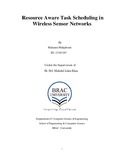| dc.contributor.advisor | Khan, Md .Muhidul Islam | |
| dc.contributor.author | Mahjabeen, Maksura | |
| dc.date.accessioned | 2016-05-31T09:55:51Z | |
| dc.date.available | 2016-05-31T09:55:51Z | |
| dc.date.copyright | 2016 | |
| dc.date.issued | 2016-04 | |
| dc.identifier.other | ID 13101297 | |
| dc.identifier.uri | http://hdl.handle.net/10361/5414 | |
| dc.description | This thesis report is submitted in partial fulfillment of the requirements for the degree of Bachelor of Science in Computer Science and Engineering, 2016. | en_US |
| dc.description | Cataloged from PDF version of thesis report. | |
| dc.description | Includes bibliographical references (page 37-39). | |
| dc.description.abstract | Wireless Sensor Networks (WSNs) consist of so many sensor nodes capable of sensing, processing and transmitting sensed information to a remote station. Among the application of wireless sensor networks target tracking is considered as the most significant and pre-eminent application. While tracking multiple objects, it is very important to schedule the task in an efficient manner such that we can get optimal result by maintaining energy constraint. Here, we develop a method that would be able to find out the best possible result in accordance with the prominent trade-off between these two factors. Furthermore, tracking multiple objects is more formidable than single target tracking as the speed, position and movement of targets can be different. Also, there are issues of connectivity failure and high power consumption that could lead us to data loss in a system. In our paper, we consider the sensor nodes as intelligent agents that will adapt the next task by observed application behavior by using cooperative reinforcement learning where we introduce a reward function based on our specific condition that includes energy efficiency and performance. Simulation results show that our proposed methods provide better trade-off between power consumption and performance comparing with the existing methods | en_US |
| dc.description.statementofresponsibility | Maksura Mahjabeen | |
| dc.format.extent | 39 pages | |
| dc.language.iso | en | en_US |
| dc.publisher | BRAC University | en_US |
| dc.rights | BRAC University thesis are protected by copyright. They may be viewed from this source for any purpose, but reproduction or distribution in any format is prohibited without written permission. | |
| dc.subject | CSE | en_US |
| dc.subject | Computer science and engineering | en_US |
| dc.subject | Task scheduling | en_US |
| dc.subject | Wireless sensor networks | en_US |
| dc.subject | Reinforcement learning | en_US |
| dc.subject | Trade off | en_US |
| dc.subject | Resource aware | en_US |
| dc.subject | Reward function | en_US |
| dc.title | Resource aware task scheduling in wireless sensor networks | en_US |
| dc.type | Thesis | en_US |
| dc.contributor.department | Department of Computer Science and Engineering, BRAC University | |
| dc.description.degree | B. Computer Science and Engineering | |

